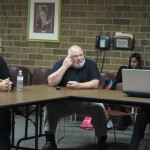Author and psychologist Roger Lubeck led a group of twenty four writers October 20th through a writer’s self-assessment workshop to prepare folks for National Novel Writing Month.
Roger, who is the Editor of the upcoming Journey short story anthology The Day Before The End of the World (to be published October 31, 2012), is by training a psychologist and a business training consultant. He began by noting:
- The novel you write and finish 2012 is a *first* draft.
- Most authors edit their books 5-11 times.
- Sometimes books are over 50k words and aren’t finished. Finishing is very hard.
- Pacing yourself through this process; thinking about what helps you write are very important.
Those participants who had experienced not-finishing in the past shared their reasons for not finishing: not enough time, not enough planning, not enough mojo.
Exploring similarities in people
There is a DISC model of behavioral styles that Roger shared with the workshop participants. This model has four basic styles:
- direct/dominant – control-oriented, competitive, verbal, results-focused, not people-people, indifferent to people, like to get their own way, fly by the seats of their pants – likely not to plot their stories (will write from the seat of their pants)
- influencer – very verbal person, optimistic, positive, outgoing, friendly, tend to be sales people, great starters but not good finishers, never follow rules, start too many things
- steady – introverted or shy, rule-follower, finisher, at work they are the most cherished at a work place, sincere and honest, do what they are supposed to do
- careful/conscientious – highly organized, rules-governed, like lists, like to make lists, will plot
There are, of course, other models; but this is one that Roger tied to writing styles.
The reasons people plot/prepare or don’t (as Tom Ostler noted in his workshop) is because of their behavioral style. Some people are organized and like to get their thoughts organized.
There are no absolute truths about writing–what works for you, works for you and may not work for me. You have to figure out what works best for you. Get rid of what doesn’t work for you.
Roger asked us to choose between: fast-paced and outspoken OR cautious and reflective
I chose: cautious and reflective
We then had to choose between: questioning & skeptical OR accepting & warm
I chose: accepting and warm
Mappings
- Fast-Paced&Outspoken AND questioning & skeptical -> D
- Fast-paced & outspoken AND accepting and warm: I
- Accepting and warm AND cautious & reflective – S
- Questioning & skeptical AND Cautious and Reflective – C
Hmm… this means I mapped out as: Steady
Practical Advice
Roger strongly recommended folks to try in a different genre, noting that there are a lot of fantasy writers in NaNoWriMo.
Most of us write at a 6th or 7th grade level; add a strong vocabulary will make a much better novel.
Boosting your grammar skills
- www.grammarbook.com
- satgrammar.comhas 15 different grammar tests
- Purdue’s online writing lab (OWL)
Grammar is important; publishers will judge you by the mistakes they find. This is really important. If you have serious grammatical errors on page one, the publisher will likely not read further.
Don’t rely entirely on Microsoft’s grammar tools.
There are 21 rules for commas.
Don’t use exclamation marks.
If you are quoting a fragment of something, the period goes outside. You have to know when to “hold ’em”.
If you don’t know the rule, change the sentence.
If you don’t know if a word is hyphenated, there is an easy answer–look it up.
Exercises
Write 3-5 story ideas you are considering for NaNo.
Generating ideas and story: all stories start with a kernel of an idea.
Brainstorming is a technique developed to generate novel ideas.
Rules:
- write down 5-10 ideas (important to commit the idea to paper; otherwise, you’ll ad-lib an idea)
- one at a time, each person reads their idea
- each new idea is written on a list
- duplicate ideas are deleted and a new idea must be written to replace the deleted idea
- continue until there are no new written ideas
- typically the last ideas are the most unique
Brainstormed ideas:
- the nanobots gang up to attack a writer (Brian)
- a girl uses magic to go to purgatory to retrieve her boyfriend’s soul and bring him back to life (Rebecca)
- a migrant worker wants to become secure in the new ladn
- the chicago fire …
- aliens manipulate humans to acts of terrorism
- a puppy is abandoned and tries to find its way home
- every day, the human race loses one of its senses (to change the next day)
- a man’s muslim girlfriend is
- future where Apple are evil overlords
- an unstable woman writer tries to get her anti-war book published (start of WWI)
- colony of exiles in alternate history greece
- woman whose family is mass-murdered …
- people wake up to find out they’ve been transsported to a new planet
- newly single woman surviving in Chicago with a son who is handicapped
- writer who writes only in his dreams
- teenage girl who finds out there is an alternate world
- Four kids find a ring and are transported to a magical world where there is a war to find and assemble the sevenfold ring.
- story about McKinney the animal rights … who accidentally blows up an animal clinic
People want to short-cut the brainstorming process.
Brainstorming in a group will result in very creative things. It is exciting to start with a creative idea.
- Combine ideas to make a stronger story? Synthesis can strengthen an idea.
- Eliminate common ideas
- Eliminate it if you have read it or saw it in a movie
- Consider a popular story and find a hook
- Select your strongest ideas
- Select the idea that excites you the most.
Move from an idea to a story: depends on what kind of writer you are.
Sometimes ideas are the kernel of a story idea.
Exercise
- Idea for a story:
- Genre:
- Plot type/overarching theme:
- Possible answers: happy/tragedy, good/evil, a quest, journey, rags/riches, coming of age, rebirth, fall
- A quest has a goal
- A journey just is about the journey
- All stories have to have some level of tension/conflict: what is the source of the conflict/tension
- Narrative:
- This is a way to expand the idea out a bit.
- The great, great nephew and niece of an Irish miner
- Setting:
- Opening scene
- Second act
- Third act
- Ending
Writing in a new genre: What are the best example of that genre. Copying (style) is ok; plagiarism isn’t.
You can have multiple themes in the story; sometimes stories are very simple in their theme.
In the Godfather, the opening scene is a wedding (lets you meet everyone, learn that the Don has to honor requests, sets up the theme of the importance of family)
Acts build, something happens dramatically, you move to the next stage of the story.
A novel is an opening, three acts and an ending.
What will the opening scene be? Write your ending.
Flesh out the characters.
Some people won’t define characters up front, just write things and will rename people afterwards. (“I” people).
Some people plan things out ahead of time.
Exercise
Write a three character scene in 300 words or less
- man
- woman
- waitress
Write it from the POV of one character (third person restricted)
You can add description afterwards, adding dimension and texture to your writing.
Some people like to write the events first and then they’ll go back to add detail in rewriting.
Challenge: write the story in first person.
Third person omniscient: old style
POV Pure dramaticzation: a story is very close to a play: readers receive almost all dialogue and very little narration, usually little more than stage direction.
Write an opening scene: try it in first person and then in third person.
- Goal in November: to finish
- When will I start: November 1st
- Words per day: 2000
- When to write: whatever works for you
- when not to write: when you’re tired, drunk, high, exhausted
- where to write: wherever you enjoy writing
- How long should I write each day: till you reach the goal you set for yourself
- End each day on a cliff hanger or an incomplete paragraph or even sentence
- When to blog on a journal? December
- You can put the participant badge in your e-mails
- When to edit: edit every day but don’t rewrite
- rewriting != editing (spelling,grammar)
- real rewriting and editing should happen in January
- What if you’re behind
- Develop the discipline of writing. http://750words.com
- Reward yourself for writing daily.
- Shift to backstory of your novel if you are blocked in your main plotline.
- The nano site will tell you #words you have to write to make 50K
- make sure you have fun
-
Reference Files





No Comments